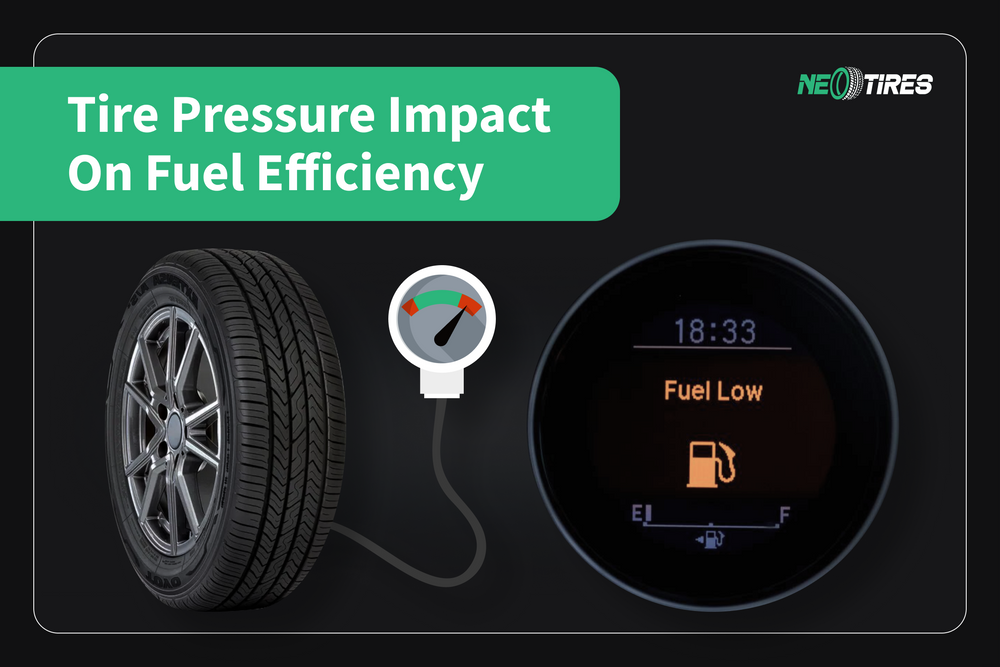Some drivers claim that tire pressure affects fuel consumption. Others believe that this idea is just a myth. And yet, what do we, car lovers who want to know the correct answer, do with this dilemma?
We all know that many factors directly influence the gas mileage in our cars. And while all the factors have a technical explanation behind them, tire pressure does not seem to be somehow directly related to gasoline consumption (or, does it?!). Some car drivers swear that they have tested the fuel consumption in different pressure configurations. They conclude that tire pressure has nothing to do with it and they have stopped being responsible for tire proper inflation.
But is this decision correct? Of course not. Tires must always have adequate pressure. The reason is that tire pressure improves the overall performance of the car and extends the life of the tires. So regardless of fuel consumption, you have at least 2 reasons to maintain optimal pressure for your tires.
Either way, today is about fuel consumption and how it is affected (or not???) by too little or too much tire pressure. I undertake to decode this subject to its core so that you will know the answer once and for all. With these in mind, I propose to get down to business.
Why Is Tire Pressure Important?
Why do tire manufacturers include indications about the Maximum Allowable Pressure on tire sidewalls? Is it a design tool? Not at all. Manufacturers inform drivers about the optimal tire pressure level that can meet the following criteria:
- ensures safety while driving;
-protects tire condition from early wear;
-generates less fuel consumption.
Everything that goes above or below the pressure recommended by the manufacturer directly impacts these 3 criteria. So the first conclusion you have to make is that you have to trust the manufacturer and not neglect what it recommends if you don't want to run into vehicle issues.
How Does Tire Overinflation Affect Fuel Consumption?
Common debates regarding the influence of pressure on fuel consumption are divided into 2 ideas:
- low pressure hurts fuel consumption, leading to fuel loss;
- high tire pressure has a positive impact on consumption, saving fuel amounts.
According to the logic of these ideas, all drivers should aim for a higher than recommended pressure to save energy. But how correct is this idea?
From a certain point of view, the idea seems to make sense and logical; after all, over-inflated tires use less energy in comparison to under-inflated ones. And that's exactly what fuel is: energy for the vehicle. However, I decided not to rely only on subjective opinions from several forums, but on the recommendations of the major tire manufacturers. They have different opinions on these common beliefs. 1
Tire Pressure and Fuel Consumption
The manufacturers inform us that technically, high tire pressure indeed brings a positive contribution to fuel consumption. However, the contribution is not so significant, as are the other negative aspects that appear as a result of the hyperinflation of the wheels. In short, global tire manufacturers see neither essential meaning nor necessity in tire overpressure.
Drivers tend to play with manufacturers' recommendations, unfortunately. These disregard the fact that manufacturers take into account the optimal fuel consumption when establishing the recommended tire pressure. So, effectively, there is no need to insist on additional fuel economy, because the manufacturers have already included it in the calculations made at the tire production stage. As a result, the end user receives a tire that already has the idea of fuel economy in its DNA.
Is Overinflation Good for Fuel Efficiency?
While technically, an overinflated tire brings benefits to consumption (even if they are marginal), drivers forget about the other consequences related to tire overpressure. Driving comfort suffers, the car's handling is affected, and the tires wear out faster because the tire "footprint" changes negatively over time.
At the same time, the car becomes heavier and more rigid with the increase in tire pressure. A no less important aspect is the eminent decrease of traction in wet conditions as well as the impact of the ability to turn. Is all this chain of adverse effects really worth it for an insignificant fuel economy?! 2
Is Under Inflation Good for Fuel Efficiency?
I don't know if the above explanation surprised you. But I know for sure that it impressed those who were categorically FOR adding some extra pressure into their tires for fuel economy purposes. Now I hope you understand that, in the long run, you are not saving fuel, but you actually are subjecting yourself to greater risks that come as high tire pressure side effects.
I'm sure you're curious to find out how correct the myth about low tire pressure is. Does it or does it not affect fuel consumption?
To avoid long suspense: yes, it affects, and it does it quite noticeably. And it's not just me saying this, but it's no other than the U.S. Department of Energy. I will not write mathematical calculation formulas to demonstrate the relationship between pressure and consumption. However, what you need to know is that the idea is not a myth at all and is confirmed by specialists in the field.
Temperature Affects Tire Pressure
Fuel consumption in the context of low tire pressure also depends on the outside temperature. For example, a passenger vehicle with low-pressure tires will lose an average of 0.4% of fuel for every 1-psi decrease in pressure. In very cold conditions, the tires lose another 1-2 psi as the temperature drops. Add to this that tires lose pressure naturally due to air loss during driving and you can get by with a fairly significant fuel drop.
What is the solution in these circumstances? Everything is more than simple: have some fuel-efficient tires and check your tire pressure regularly, at least once a month, or every time you feel the need.
Tire Pressure And Fuel Efficiency: FAQs
Does Tire Pressure Affect Fuel Consumption?
In short, yes it does. If the tire does not have enough pressure, it leaves more rubber on the road surface. This increases tire rolling resistance, which means burning more fuel. According to the U.S. Department of Energy, if even 1 psi is missing in the 4 tires, fuel consumption increases by 0.1%. In the long term, the difference becomes noticeable. In the case of overinflation, the shape of the tire also changes. This might not impact fuel consumption too much, but the tire is subject to faster wear. That will lead to the need for tire replacement earlier than expected.
Do Overinflated Tires Use More Fuel?
According to studies and tests, overinflation might be efficient in terms of fuel consumption. But the benefits are minor. An aspect that many drivers ignore is the early and uneven wear of overinflated tires. This means that while saving only a little fuel, the driver will have to change the tires earlier than expected because of early wear. As such, the fuel-saving benefit is not justified at all.
Why do Properly Inflated Tires Improve Fuel Efficiency?
Tire makers produce their tires taking into account their optimal rolling resistance. Precisely for this reason, they recommend a certain pressure level at which the tire performs the best while keeping low rolling resistance. When the driver puts too much or too little air in the tire, it becomes saggy or too inflated, which negatively impacts tire rolling resistance, and therefore fuel efficiency.
Is it Better to Underinflate or Overinflate Tires?
Neither of them is a good decision. There are only a few exceptions when underinflation makes sense. For example, off-road driving is accepted with slight underinflation because the driving is usually slow and the casing of the off-road tires is reinforced. As for the usual passenger tires, over and underinflation brings more side effects than benefits. We encourage you to stick to the manufacturer's recommendations.
Why Does Low Tire Pressure Use More Gas?
Low pressure causes the tire to change its correct shape to the road. The tire edges go down too hard, which leaves more rubber on the road. This effect increases tire friction, which shortens its lifespan AND increases fuel mileage. Fuel consumption increases because the car exerts more effort to propel more rubber on the road.
Why Trust Us?
The NeoTires team deals not only with finding the best tire deals but also with the deep study of tires. This means that we run our own tests, evaluate performance ratings, and observe tire behavior in various road and weather conditions. We do all this with the help of special equipment and experts in the field with whom we closely collaborate.
Our mechanics and testers are proud of over 20 years of experience in the industry and can evaluate and review extensively and objectively various tires. Last but not least, our content creators ensure the veracity of the information they present by validating it with the help of official sources and statistics.
At the end of the day, selling tires is just a secondary goal for us. The basic objective is to match drivers' needs with the right tires. We spend a lot of time in our technical center where we compare, test, evaluate, and decide what are the benefits and disadvantages of various products. We want our customers to have professional services and products. So far, it seems to have worked out great for us. Feel free to keep an eye on NeoTires because here we learn, develop, grow, and share all we know about rubber on the road.
Bottom Line
The conclusion is to listen to the opinions of specialists in the field. There are hundreds of internet sources informing about all kinds of consequences of high/low pressure on fuel consumption. However, not all of them are true and are only based on the personal conclusions of the authors, who are not always specialists in the field. So, we recommend that you take into account the official sources of the big tire and car manufacturers. They work side by side for optimal compatibility between tires and car bodywork, as well as for safe driving and optimal fuel consumption.
Also, playing with the manufacturers' suggestions is a tricky thing. You could be subject to road accidents if you ignore the manufacturers' recommendations. In this context, strictly follow their suggestions regarding the recommended tire pressure. This will ensure safe driving and optimal fuel consumption for many years to come.





